Professional Activities Report
Ray P. Authement College of Sciences
January 1, 2015 - December 31, 2020
Azmy S. Ackleh, Dean
Unit Reports
- Office of the Dean (pdf)
- Department of Biology (pdf)
- Department of Chemistry (pdf)
- Department of Mathematics (pdf)
- Department of Physics (pdf)
- School of Computing and Informatics (pdf)
- School of Geosciences (pdf)
Executive Summary
General
Established in 1974, the Ray P. Authement College of Sciences is dedicated to the advancement of scientific knowledge through research and to the extension of the scientific heritage through teaching. In the 2015-20 academic years, the College offered 8 B.S. degrees (Biology, Chemistry, Computer Science, Environmental Science, Geology, Informatics, Mathematics, and Physics), 8 M.S. degrees (Biology, Computer Engineering, Computer Science, Environmental Resource Science, Geology, Informatics, Mathematics, and Physics), and 5 Ph.D. degrees (Biology, Computer Engineering, Computer Science, Earth and Energy Sciences, and Mathematics). Additionally, the College houses pre-professional programs in medicine, dentistry, veterinary medicine, physical therapy, and pharmacy and oversees the program in Military Science. The academic structure of the College as of Fall 2020 is shown in Figure 1.
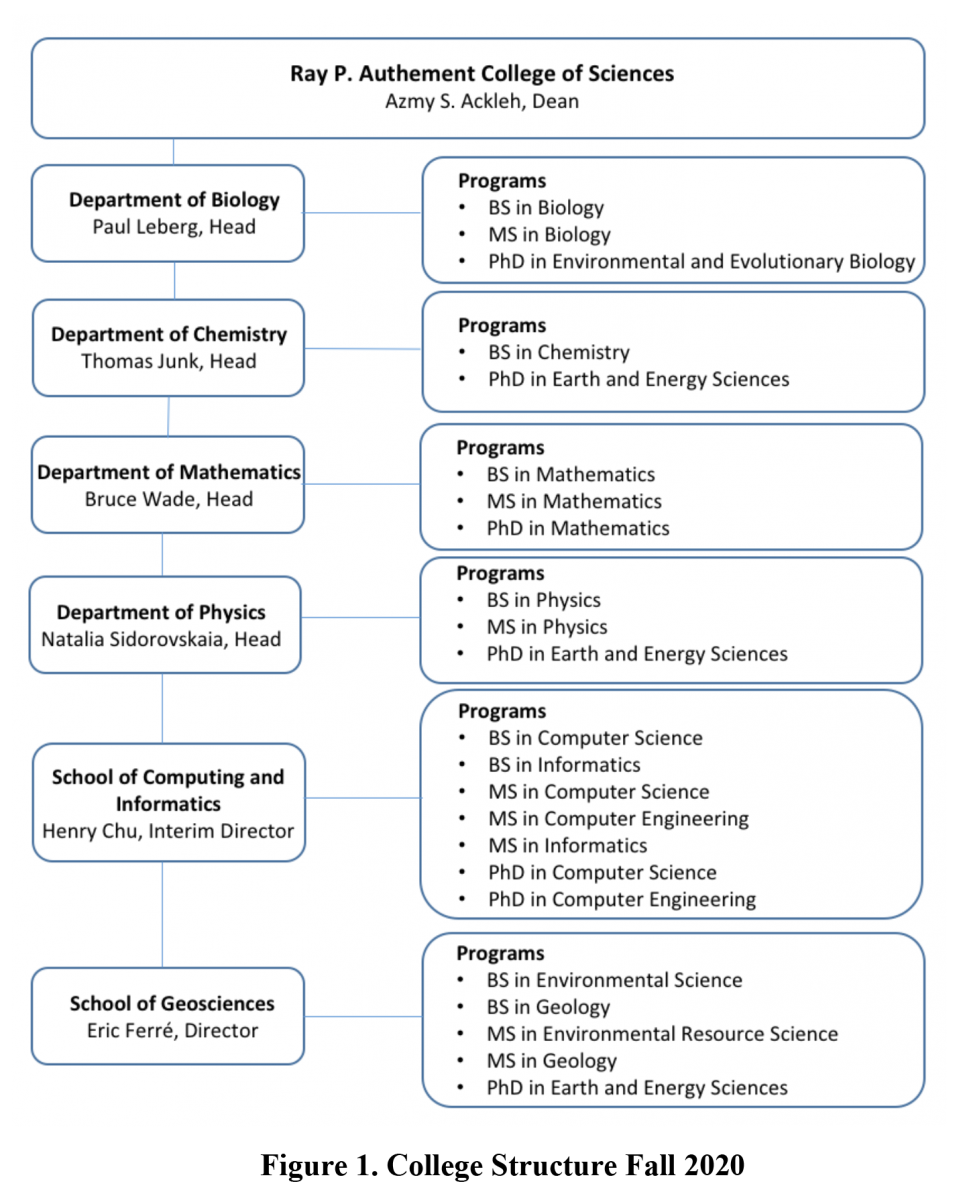
Activities: 2015 - 2020
The Ray P. Authement College of Sciences is a top-notch research college that compares favorably with the best Colleges of Sciences among universities located throughout the Gulf States region as evidenced by the quality and number of peer-reviewed publications, externally funded grants, and graduate placements. The three established doctoral departments in the College of Sciences are nationally ranked by the National Science Foundation (Higher Education Research and Development Data Report, 2019) as 56th in Computer Science, 59th in Mathematics, and 139th in Biology. What makes the Ray P. Authement College of Sciences so strong? We believe that the Ray P. Authement College of Sciences is outstanding primarily because it brings together world-class research and teaching faculty, dedicated staff and highly motivated students all of whom possess a passion to understand the workings of the world and the universe.
The structure and the many achievements of the Ray P. Authement College of Sciences during the past six years are highlighted in this report and are summarized in the following.
Faculty: The College has been very successful in hiring outstanding new faculty with steadily increasing numbers from a low in the year 2014 to a total number of 137 in 2018. This high dropped to 127 in 2020 due to the number of retirements and resignations that could not be replaced given the current level of University funding and a drop in student enrollment at the University level. In general, the number of assistant professors has increased relative to the slightly decreasing number of full professors, while the number of associate professors has decreased.
Students: Undergraduate enrollment has steadily increased to an average of 1987 students over the past six years, while the number of graduate students has remained relatively constant at around 300. In contrast to the overall declining university enrollment trend, the total enrollment in the College of Sciences has seen an all-time high of 2375 students in 2019 and stood at 2273 in 2020. Parallel to the increasing enrollment, graduation numbers have seen a steady increase to an all-time high of 376 degrees awarded in the past year. The College of Sciences is a major contributor to the university’s graduate education with an average of 78 M.S. and 18 Ph.D. degrees awarded each year.
Research: The College continued on its path with strong research and scholarly activities. With an average of 205 peer-reviewed journal articles and 47 proceedings publications per year and generating an average external funding of over $14 million per year, the College is one of the most important contributors to the reputation and national and international recognition of the University.
Faculty
As shown in the bar chart and pie chart in Figure 2, the total number of faculty members in the College in the Fall 2020 semester stood at 127, down by ten faculty compared to 2018 which had reached the highest faculty total (137) ever recorded in the College. Despite this loss of faculty, the College continues making considerable contributions to the University’s mission of research, teaching, mentoring of students, and public outreach.
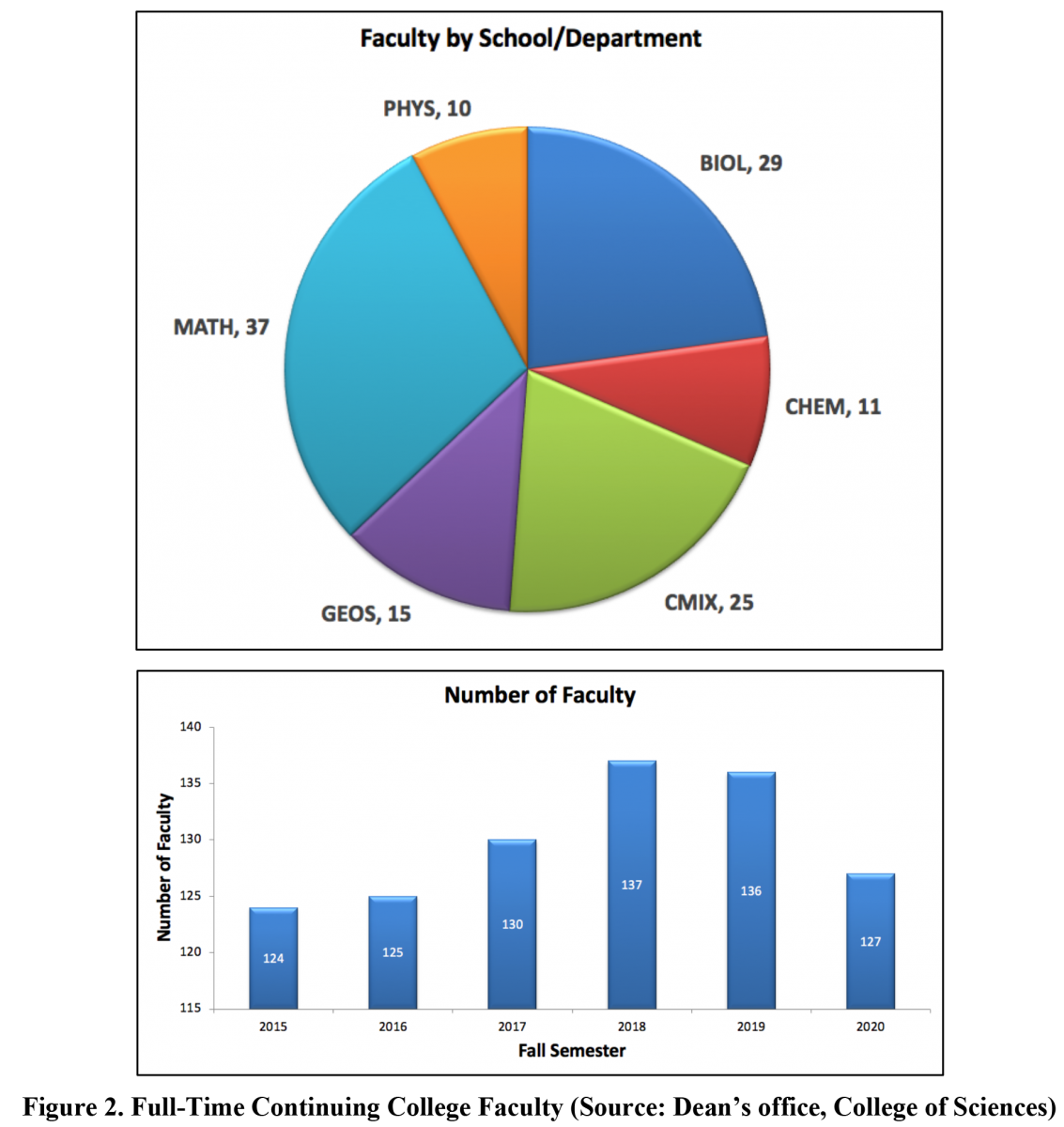
The stacked bar chart in Figure 3 (top) shows the number of Ray P. Authement College of Sciences faculty, relative to the number of UL Lafayette faculty outside the College. It is worth noting that, despite the fact that the Ray P. Authement College of Sciences faculty comprise only 20.6% of the total UL Lafayette Faculty (6-year average), the research publications, grant awards, and graduate student graduation rates are substantial.
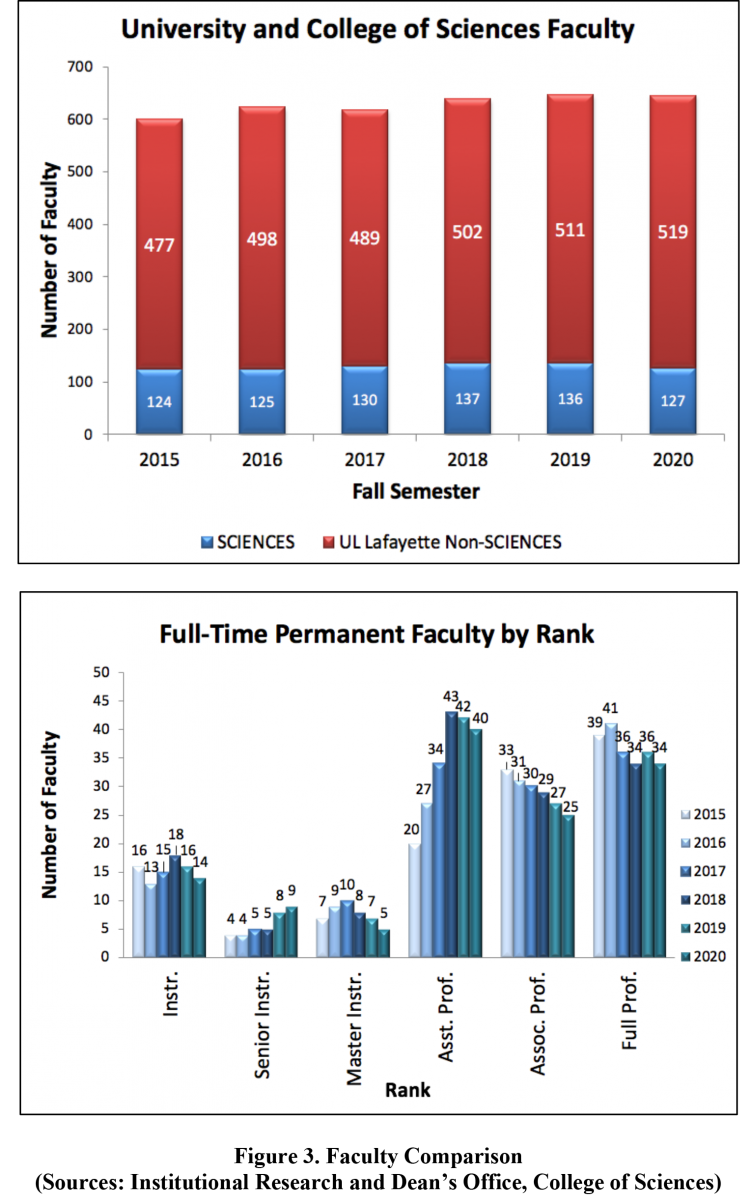
Our remarkable faculty advance along two career tracks: the Instructor track which emphasizes classroom, laboratory, and field instruction, and mentoring of students; and the Professorial track, which emphasizes teaching, research, publishing, and mentoring of graduate students and post-doctoral fellows. Those faculty members who excel in the Instructor track progress from Instructors to become Senior Instructors and eventually may become Master Instructors. Those faculty members who excel in the Professorial track progress from Assistant Professors to become Associate Professors and eventually may become Full Professors. The lower bar chart in Figure 3 shows that faculty members of the College are well represented at each rank and that the number of Assistant Professors has doubled over the past 6 years. The number of Associate Professors has constantly decreased, while the number of Full Professors has seen only a minor decrease.
Student Enrollments
The chart in Figure 4 shows the total number of students taught in lecture, laboratory, and field classes in the Ray P. Authement College of Sciences for the Academic Years 2014-2015 through 2019-2020. Currently, our faculty are teaching classrooms and laboratories, and field courses containing more than 36,700 students each year, approximately one-fourth of the total number of students taught across the University. The observed trend of decreasing student enrollment in classes since the 2015-2016 academic year taught by the College of Sciences is parallel to the overall trend of decreasing student numbers at the entire University.
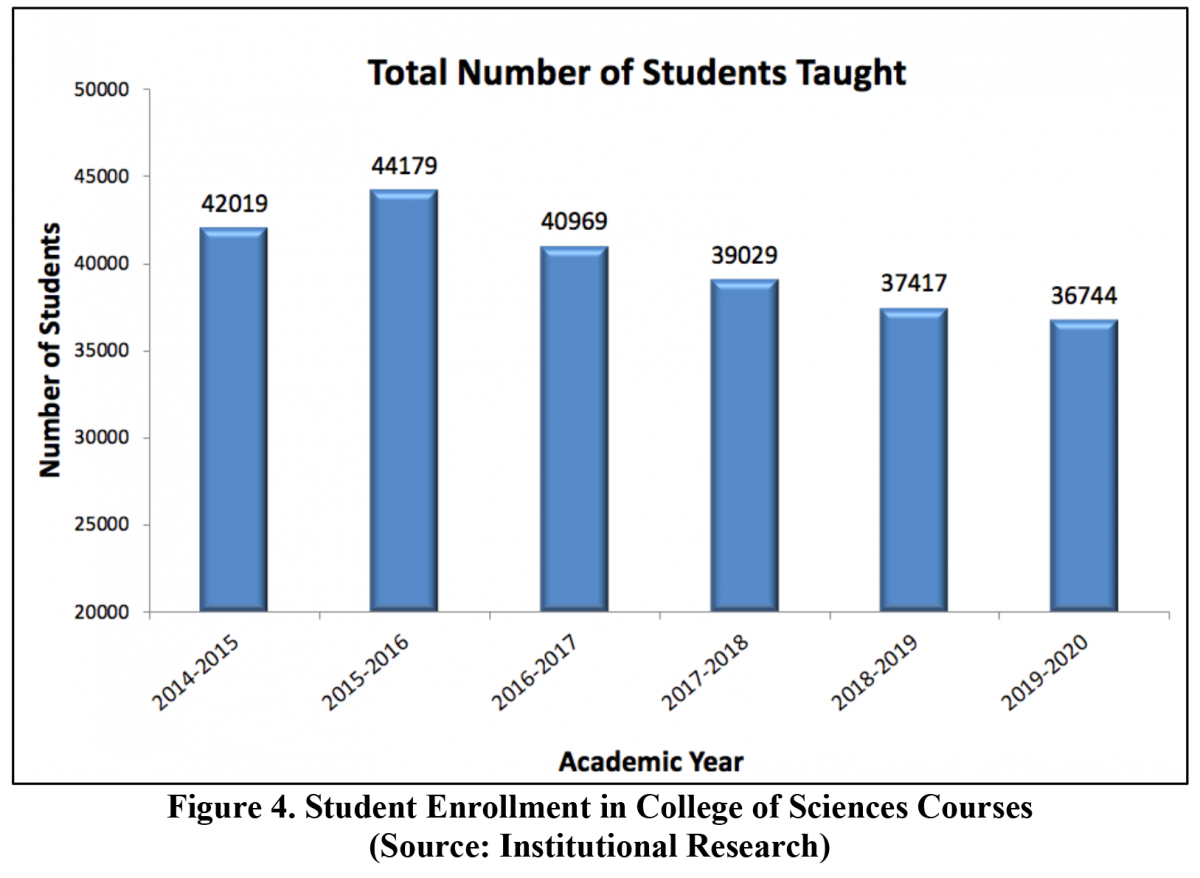
The two charts in Figure 5 illustrate enrollment of undergraduate majors and total enrollments (i.e., of undergraduate majors and graduate students), respectively, for fall semesters 2015 through 2020. Undergraduate enrollment has seen a consistent increase over the last decade from 1773 students in 2010 to a maxium of 2064 students in 2019. The 2020 undergraduate enrollment is down compared to the previous year, but still well above enrollment numbers prior to 2016. Graduate student enrollment has remained relatively constant over the last decade, fluctuating around an enrollment of ~300. Over the last 6-year period, 1987 undergraduate and 301 graduate students, on average, were enrolled in the programs within the College of Sciences. Because we have and will be launching new graduate programs, we anticipate growth in graduate enrollment once all of the new degree programs are implemented and fully established.
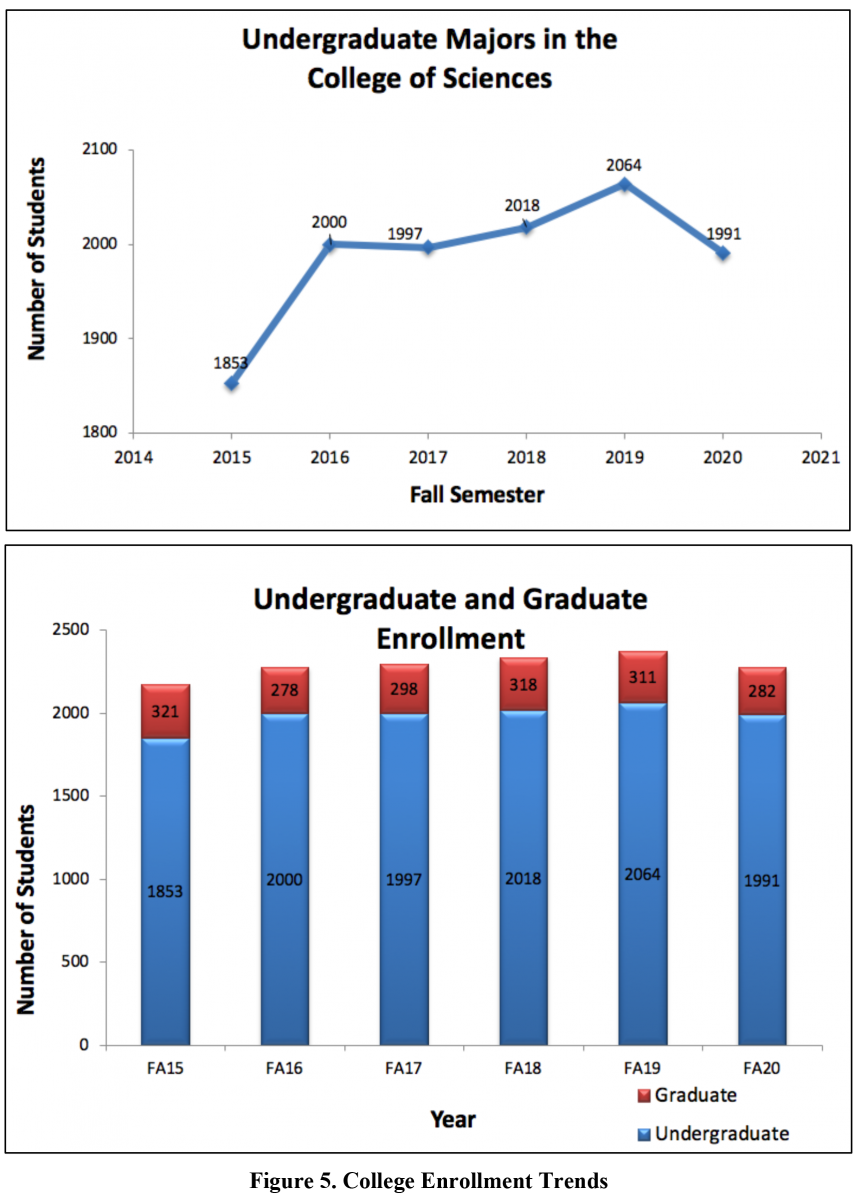
Degrees Awarded
The line chart in Figure 6 shows the number of undergraduate degrees awarded for the academic years 2014/2015 through 2019/2020. During this period, we awarded an average of 241 Bachelor of Science diplomas each year.
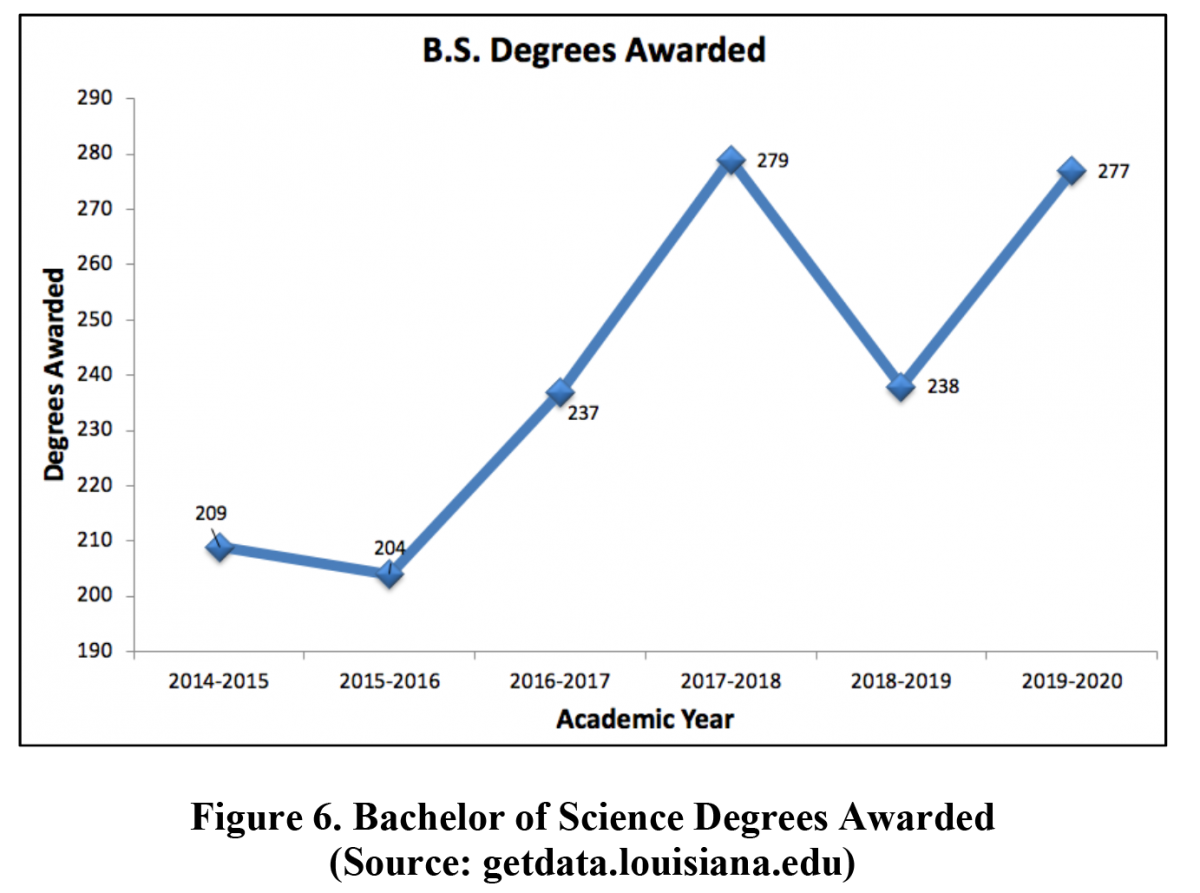
In terms of total degrees awarded (i.e., B.S. and graduate), we awarded an average of 335 diplomas in the past six years (Figure 7). The total number has seen a consistent increase over the past decade from 304 diplomas in 2010/2011 (not pictured in Fig. 7) to an all-time high of 376 diplomas in the 2019/2020 academic year.
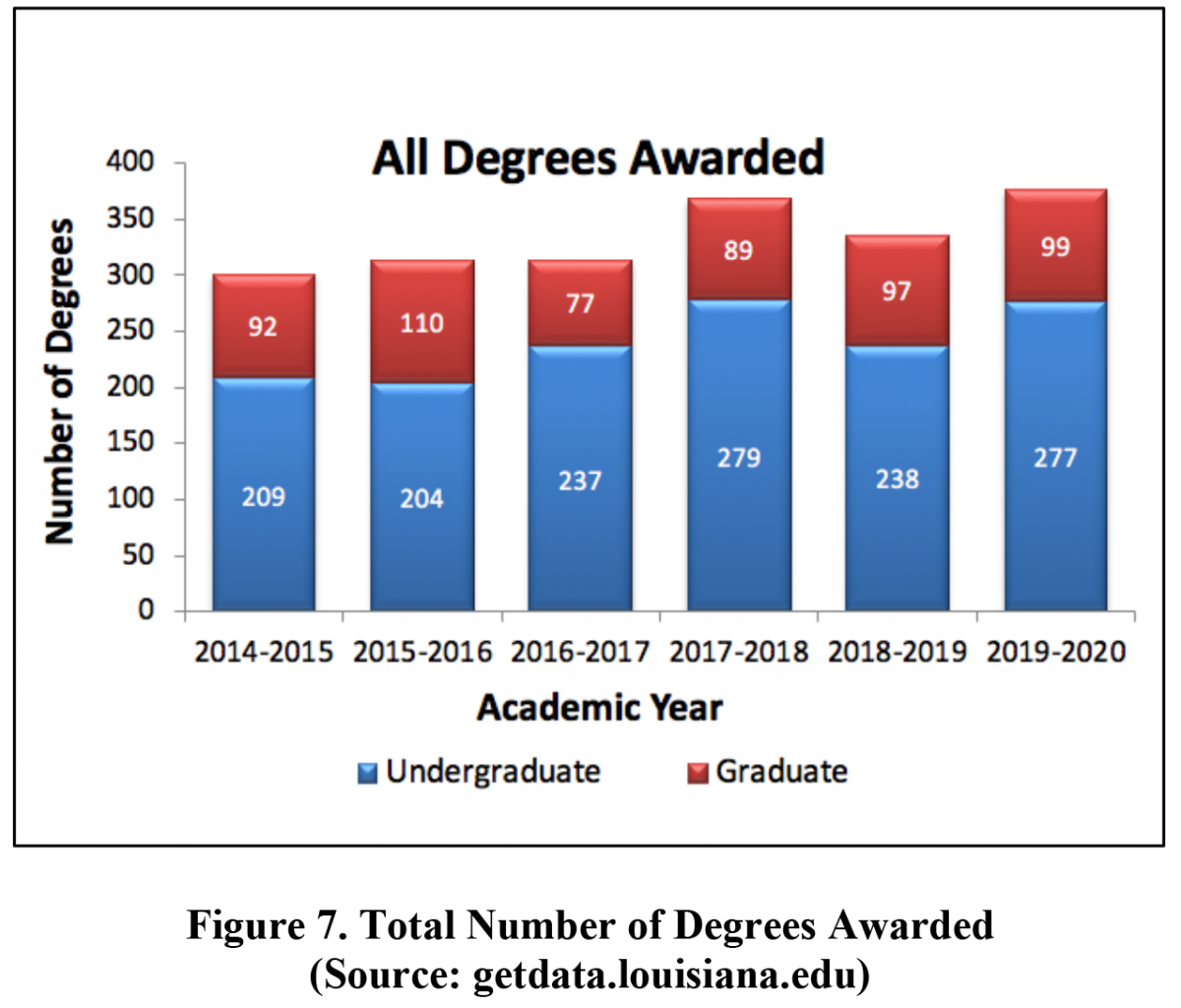
The Ray P. Authement College of Sciences cautiously expects to continue growth in the next few years. With the exception of Fall 2020, undergraduate enrollment has been steadily increasing over the past decade. Graduate enrollment has been relatively stable but is projected to increase as new graduate degree programs in Earth and Energy Sciences and Industrial Chemistry are being implemented. In the workforce, demand for STEM graduates is expected to increase. This expectation is supported by predictions by the U.S. Bureau of Labor Statistics (https://www.bls.gov/emp/tables/stem-employment.htm), which anticipates an employment change of +8% between 2019 – 2029 in the STEM disciplines compared to a 3.4% growth in the non-STEM occupations. According to the U.S. Bureau of Labor Statistics the average wage for all STEM occupations was $87,570 in 2015, nearly double the national average wage for non-STEM occupations ($45,700). Ninety-three out of 100 STEM occupations had wages significantly above the national average wage for all occupations of $48,320 (https://www.bls.gov). These data indicate continued demand for STEM graduates and suggest stable or growing enrollment numbers in the College.
Research
Faculty members of the College of Sciences engage in significant research among other scholarly activities. The charts in Figure 8 illustrate that our faculty publish on a consistent basis in peer-reviewed journals and conference proceedings, with an average of 205 articles and 47 proceedings per year over the past six years.
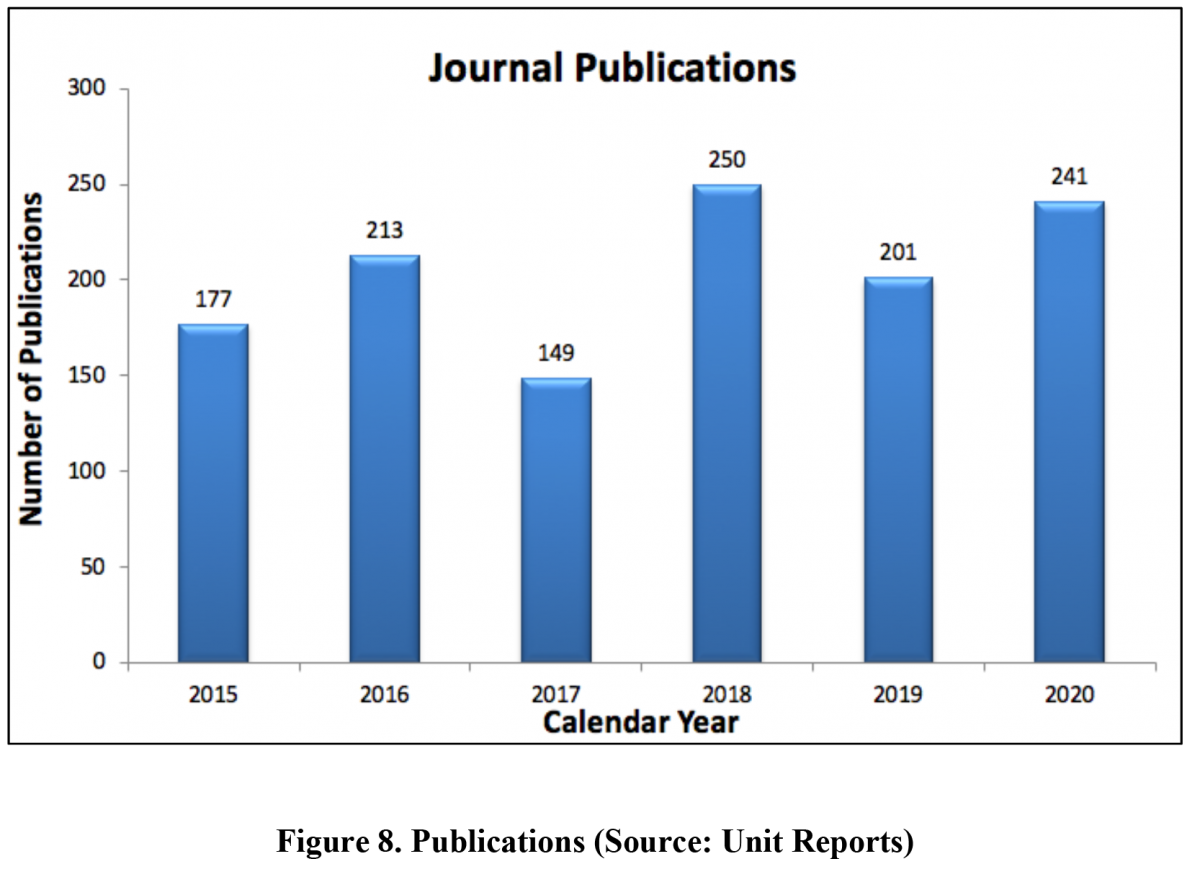
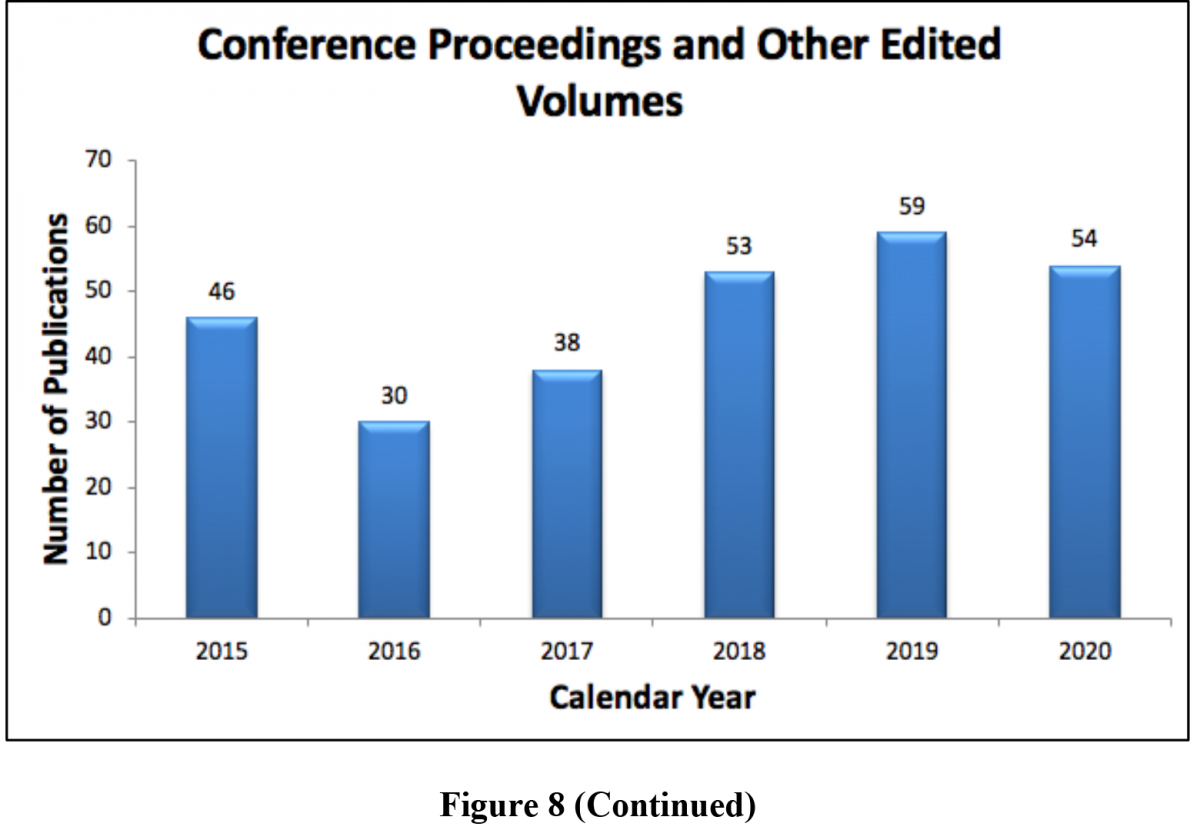
Funded Grants and Contracts
The bar chart in Figure 9 illustrates the level of success of our faculty to obtain externally funded grants and contracts. During the period spanning the fiscal years 2015-2016 through 2020-2021, faculty of the Ray P. Authement College of Sciences were engaged in externally funded research as Principal Investigators or as Co-Investigators totaling $84,194,572 (averaging over $14.0 million per Fiscal Year).
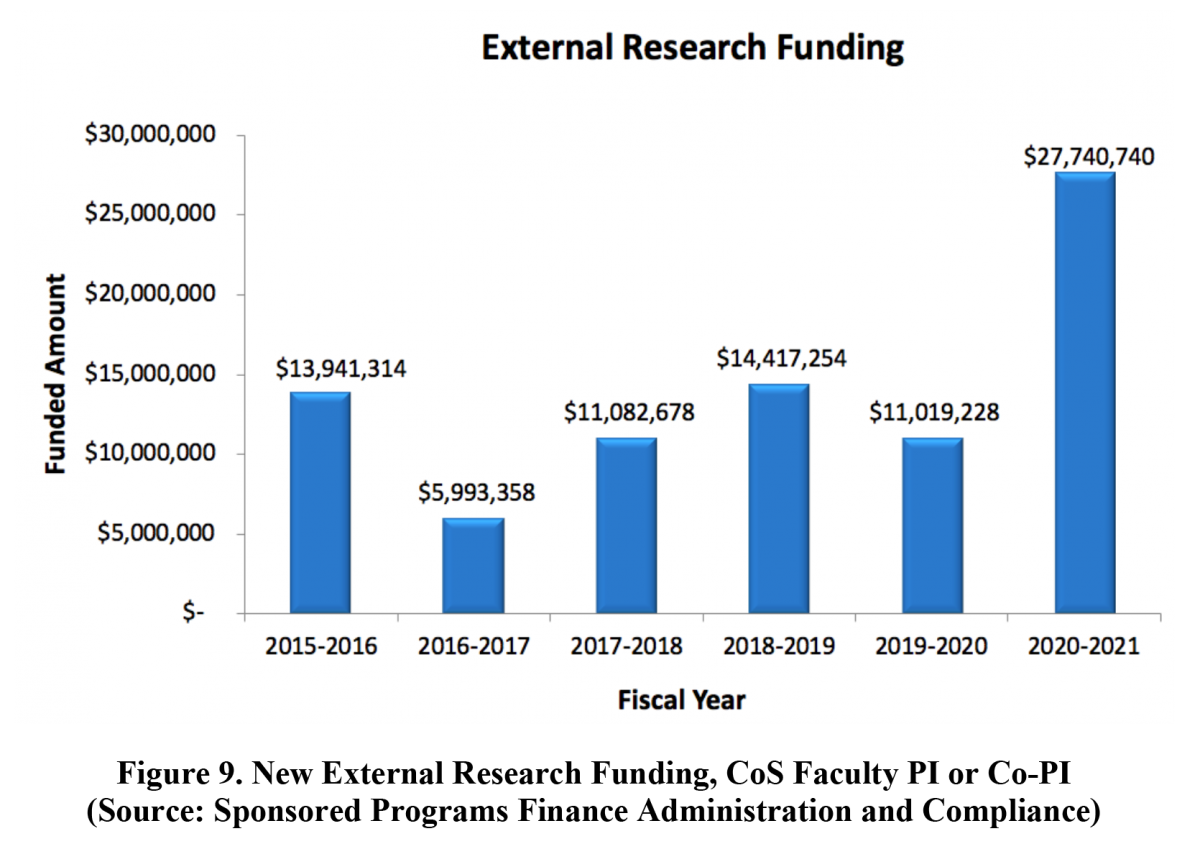
College Contributions to Graduate Student Production
As illustrated in Figure 10, contributions by the Ray P. Authement College of Sciences to graduate student production are indicative of the commitment of the faculty to mentoring students. In the previous six academic years, an average of 78 Master’s students in the College of Sciences earned their degrees each year, representing approximately 16% of the total number of students receiving Master’s degrees in the University. Thus, the College of Sciences produces a significant proportion of the Master’s degrees conferred by the University as a whole. In the previous six academic years, an average of 18 doctoral students advised or co-advised by faculty of College of Science earned their doctorate degree, representing approximately 29% of the doctorate degrees conferred by the University. Clearly, the College of Sciences is a major contributor of the University to graduate education.
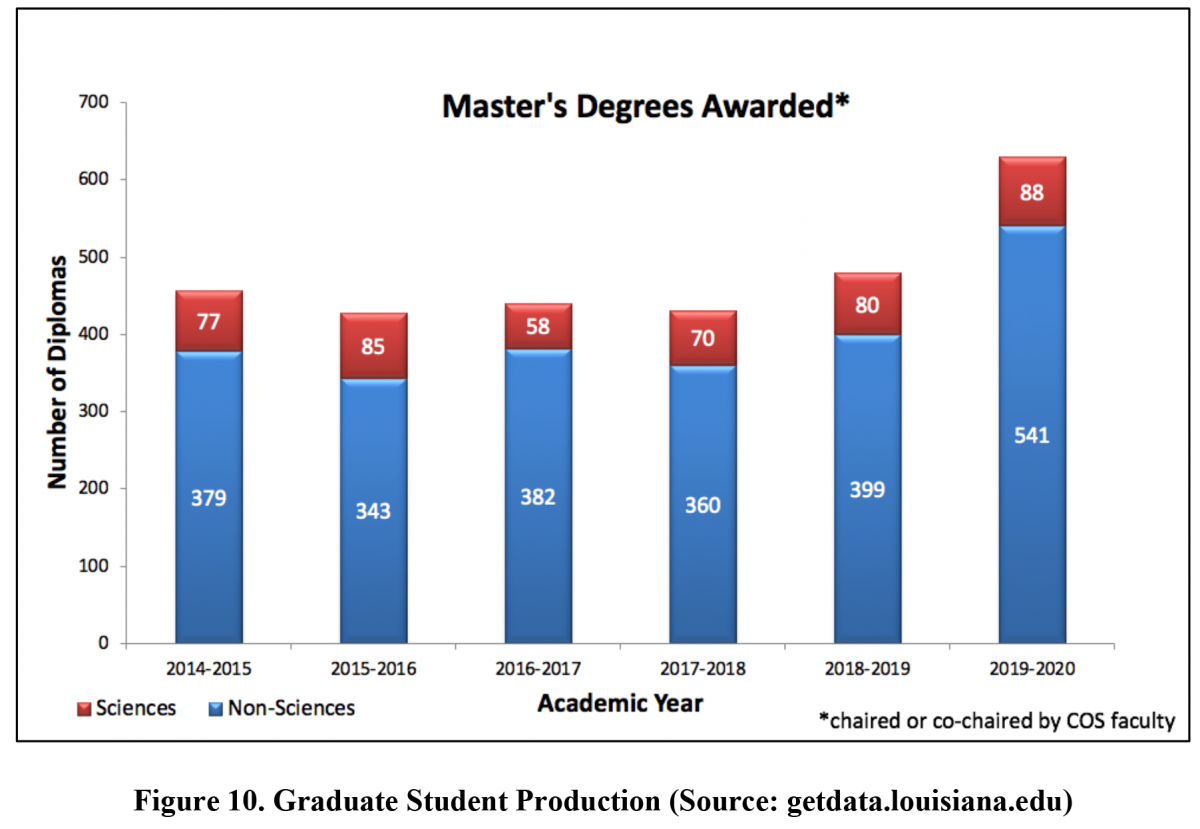
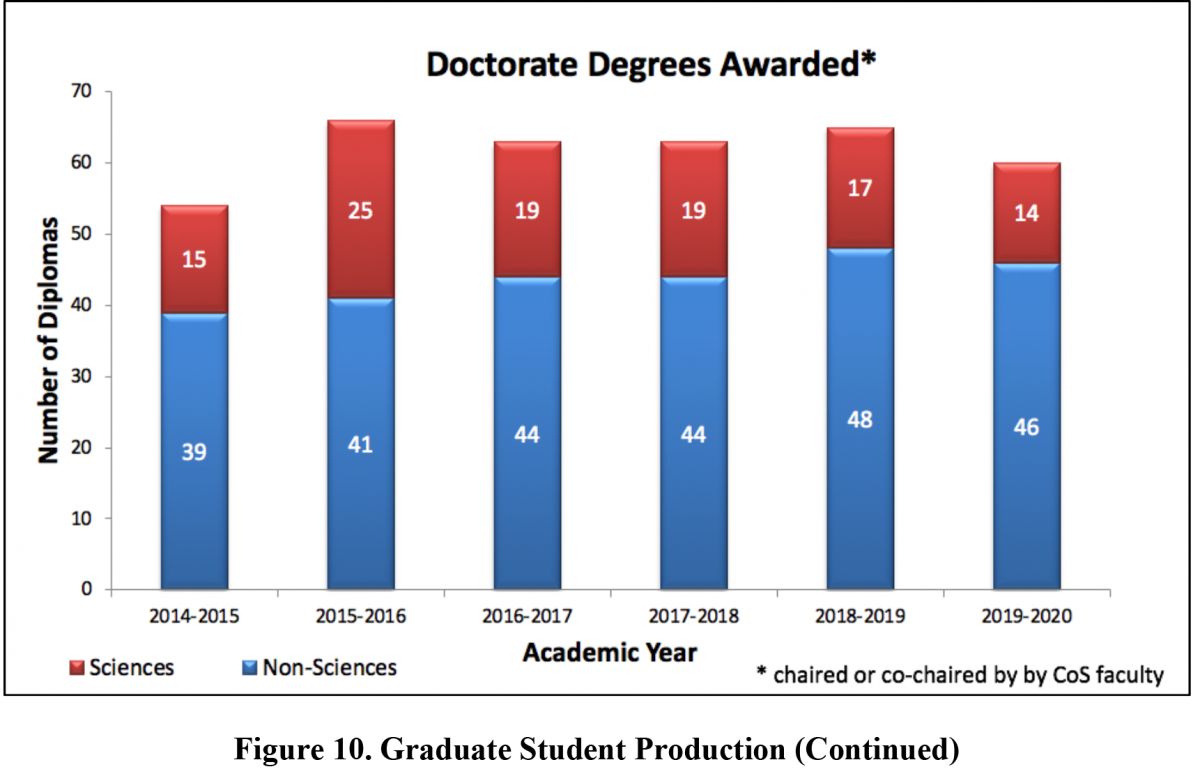
Significant Awards
Faculty and students of the Ray P. Authement College of Sciences are a distinguished group of scholars, both within the United States and around the world, as highlighted by the following selected significant awards:
- Baojin Ding: DoD Peer Reviewed Medical Research Program (PRMRP) Discovery Award. 2020
- August Gallo: Eminent Faculty Award, Dr. Ray P. Authement Excellence in Teaching, 2020.
- Amini Salehi, M., Certificate of Achievement in Innovation Award, UL Lafayette, Jan. 2020
- Natalia Sidorovskaia: American Council on Education (ACE) Fellow, 2020-2022
- Sonya Hsu: Fulbright Scholar – Romania, 2019/2020.
- Miao Jin: Outstanding Researcher Award College of Science, University of Louisiana at Lafayette
- Yu Wang: Louisiana Library Network LOUIS OER Commons Award, 2020.
- Azmy S. Ackleh, Ross Chiquet and Amy Veprauskas were awarded the Rollie Lamberson Research Award Medal by the Research Modeling Association in 2019.
- Natalia Sidorovskaia: Certificate of Achievement in Sponsored Research Award, University of Louisiana at Lafayette, 2019.
- Chiu Chan, Albert Nelson Marquis Lifetime Achievement Award in 2018.
- Febee Louka: Outstanding Faulty of Universities of Louisiana System, 2018.
- Ray P. Authement College of Sciences Distinguished Professor: James Albert (2018)
- Ray P. Authement College of Sciences Excellence in Teaching: Nona Istre (2018)
- UL Lafayette Eminent Scholars: Feebe Louka, James Albert (2018)
- Gabriela Petculescu: Office of Naval Research (ONR) Summer Faculty Fellowship Program (SFFP), June-August 2018.
- Beth Stauffer has been awarded a 2018 Early-Career Research Fellowship from the Gulf Research program of the National Academy of Sciences.
- UL Lafayette Eminent Scholars Teaching: Michael Totaro (2017)
- Radhey Srivastava: Research Excellence Award, UL- Lafayette, 2017.
- Ray P. Authement College of Sciences Distinguished Professors: Jenneke Visser, Ping Ng (2017)
- Ray P. Authement College of Sciences Excellence in Teaching: Gabriela Petculescu (2017)
- NSF CAREER Award: Sheng Chen (2017)
- Vijay Raghavan: Outstanding Achievement in Research and Sponsored Activities, Office of Research and Sponsored Programs, UL Lafayette, 2017.
- Vijay Raghavan: Innovator Award, Office of Research and Sponsored Programs, UL Lafayette, 2017.
- UL Lafayette Eminent Scholars Teaching: Patricia Mire (2016)
- Ray P. Authement College of Sciences Distinguished Professors: Mark Hester, Nabendu Pal (2016)
- Ray P. Authement College of Sciences Excellence in Teaching: Febee Louka, Patricia Mire (2016)
- East Tennessee State University Basler Chair of Excellence 2016, Karl Hasenstein
- LA DIA Fellow, 2016-2017, Beth Stauffer
- Post Secondary Educator of the Year, 2016, Louisiana Association of Computer Using Educators, Christoph Borst
- UL Lafayette Eminent Scholar Research: Paul Klerks (2015)
- UL Lafayette Eminent Scholars Teaching: Pegge Alciatore, Ross Chiquet (2015)
- Ray P. Authement College of Sciences Distinguished Professors: Carl Richter, Kalimuthu Krishnamoorthy (2015)
- Ray P. Authement College of Sciences Excellence in Teaching: Mary Lou Jumonville, Pegge Alciatore (2015)
- KITP Scholar (Kavli Institute of Theoretical Physics) at the University of California at Santa Barbara: James Dent (2015)
- C.G. Khatri Memorial Lecturer, 2015 Rao Prize Conference, Penn State University: Vijay Raghavan (2015).
- Professeur Invité at University of Paris-Orsay: Magdy Bayoumi (2015)
